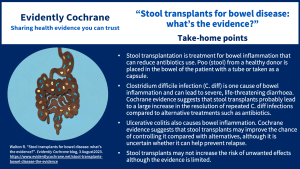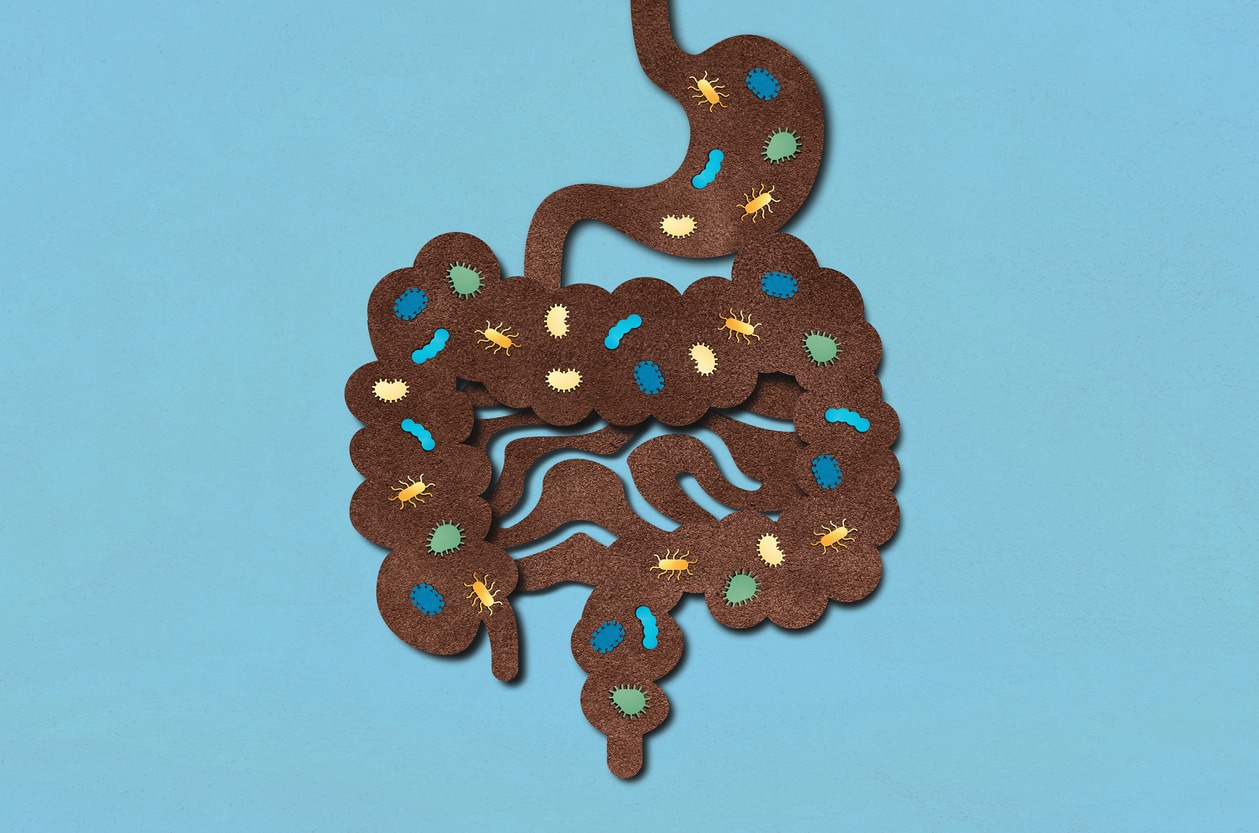.
Take-home points

It seems like an odd idea at first that faeces (poo or stools) from a healthy person might play an important part in helping someone who is ill to recover more quickly. But evidence is mounting to support the use of this new treatmentSomething done with the aim of improving health or relieving suffering. For example, medicines, surgery, psychological and physical therapies, diet and exercise changes.. Stool transplants could change the outlook for many people with certain types of bowel inflammation for whom conventional therapy offers no easy solution.
Faecal microbiota transplantation (or stool transplantation) involves taking poo donated by a healthy person, mixing it with liquid, and sometimes filtering it, then putting it into the gut of the patient in one of various ways, such as by a temporary tube from the nose into the stomach, by a tube into the bowel, or taken as a tablet.
Stool transplants for Clostridium difficile infection
Clostridium difficile, often called C. diff for short, is a bacterium which causes a very severe form of diarrhoea, often in people who are ill for other reasons or who have had to take antibiotics to treat an infection. C. diff is a very serious health riskA way of expressing the chance of an event taking place, expressed as the number of events divided by the total number of observations or people. It can be stated as ‘the chance of falling were one in four’ (1/4 = 25%). This measure is good no matter the incidence of events i.e. common or infrequent., particularly in people who are already needing treatment in hospital for other illnesses. It is thought that an altered mix of bacteria in the gut (sometimes caused by taking antibiotics) makes some people more likely to get the infection.
Conventional treatment involves taking more and different antibiotics to control the infection, which often works very well. But, given that antibiotic use often caused the problem initially, it is hardly surprising that about a third of people get a recurrent infection despite repeated antibiotic treatments. Given that some of the antibiotics that we use to treat C. diff infection are also those we try to keep in reserve for life-threatening illness, it would be a great benefit if we had a simple, effective non-antibiotic treatment for C. diff infection.
So, do stool transplants provide a good alternative?
The evidence on stool transplants for Clostridium difficile infection
A recently published Cochrane ReviewCochrane Reviews are systematic reviews. In systematic reviews we search for and summarize studies that answer a specific research question (e.g. is paracetamol effective and safe for treating back pain?). The studies are identified, assessed, and summarized by using a systematic and predefined approach. They inform recommendations for healthcare and research. on Stool transplantation for treatment of repeated Clostridioides difficile infection (April 2023) provides a neat summary of the evidence behind stool transplants for C diff including six randomisedRandomization is the process of randomly dividing into groups the people taking part in a trial. One group (the intervention group) will be given the intervention being tested (for example a drug, surgery, or exercise) and compared with a group which does not receive the intervention (the control group). controlled trialsA trial in which a group (the ‘intervention group’) is given a intervention being tested (for example a drug, surgery, or exercise) is compared with a group which does not receive the intervention (the ‘control group’). in which 320 people took part. The people giving the stool samples that were used for the treatment were all screened carefully for infections or other diseases which might cause problems for the person receiving the transplant, all of whom had had two or more recurrences of C diff.
The results were pretty impressive, with stool transplants probably more or less doubling the chance of being free from recurrence over the next two or three months compared to control. The control group included those who received placeboAn intervention that appears to be the same as that which is being assessed but does not have the active component. For example, a placebo could be a tablet made of sugar, compared with a tablet containing a medicine., standard antibiotic medications, other controls, or no interventionA treatment, procedure or programme of health care that has the potential to change the course of events of a healthcare condition. Examples include a drug, surgery, exercise or counselling. . Despite many theoretical reasons why there might be unwanted effects from the transplant, there was no evidence of this in the studies. However, overall, there wasn’t enough information to draw firm conclusions about possible unwanted effects of stool transplants.
There’s often a catch with new treatments and this one is no exception. All the studies delivered the transplant directly to the gut either by a tube passed through the nose into the stomach or with a colonoscopy directly into the rectum. Coupled with the time involved in collecting and preparing the samples for transplant this means that the process is labour-intensive and hence costly for the NHS, let alone the inconvenience to the patient. Nevertheless NICE recommends the treatment using any of these methods for people who have had two or more C diff infections.
So, patients will need to decide with advice from their doctors whether the benefit for them will outweigh the disadvantages. Another consideration in this complex assessment will be how much benefit accrues to the public at large from reducing the use of antibiotics.
Stool transplants for ulcerative colitis
Ulcerative colitis is another disease leading to inflammation of the bowel and, while the cause is not known, it is unrelated to a specific infection, at least as far as we know. The disease causes very severe illness with a risk of death if not treated. Conventional methods to control a flare-up involve taking steroids by mouth which when continued over several weeks – as is often necessary – will inevitably cause side effects. Other treatments are also used which come with their own risks of unwanted effects.
Here the evidence summarised in another Cochrane Review, Stool transplantation for treatment of inflammatory bowel disease (April 2023), is perhaps less clear than that for C diff infection. The evidence suggests that stool transplants may nearly double the chance of controlling the disease compared with control treatment and there may be little or no difference in the frequency of unwanted effects. However, it is uncertain whether there is any benefit in preventing relapse of ulcerative colitis.
The studies in this Cochrane Review used samples from the donors in much the same way as those for C diff treatment, although one studyAn investigation of a healthcare problem. There are different types of studies used to answer research questions, for example randomised controlled trials or observational studies. used capsules taken by mouth which many people might find preferable. Unfortunately, it wasn’t possible to say whether capsules were more or less effective than other methods of getting the transplant.
The authors of this review also looked for evidence in people with Crohn’s disease – another type of inflammatory bowel disease where parts of the digestive system become inflamed. However, there was a lack of dataData is the information collected through research., so the evidence is very uncertain about the potential benefits and unwanted effects of stool transplants for people with Crohn’s.
Where do we go from here?
People who think they may be eligible for this alternative treatment may discuss options with their inflammatory bowel disease team and might even consider being part of a research study (for example, this study in Birmingham).
More research is going on using stool transplants for a range of different diseases – one of which is irritable bowel disease (IBD) which is a common illness that conventional treatments can sometimes help, but not cure. There is a Cochrane Review underway which will pull together the latest evidence.
In this topsy turvy world, high-quality poo may soon become a valuable commodity.
You can join in the conversation on Twitter with @CochraneUK @rtwalton123 or leave a comment on the blog.
Please note, we cannot give specific medical advice and do not publish comments that link to individual pages requesting donations or to commercial sites, or appear to endorse commercial products. We welcome diverse views and encourage discussion but we ask that comments are respectful and reserve the right to not publish any we consider offensive. Cochrane UK does not fact-check – or endorse – readers’ comments, including any treatments mentioned.
Robert Walton has nothing to disclose.



“Bawaseer” is a term commonly used in South Asia to refer to hemorrhoids, which are swollen veins in the rectum and anus that can cause discomfort, pain, and bleeding. Treatment for hemorrhoids can vary depending on the severity of the condition. It’s essential to consult with a healthcare professional for an accurate diagnosis and appropriate treatment plan.
bawaseer ka ilaj